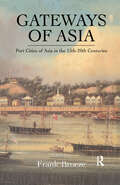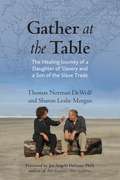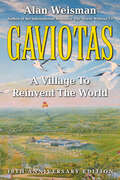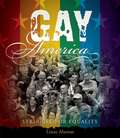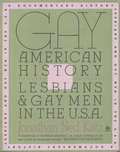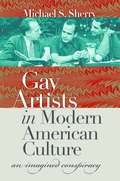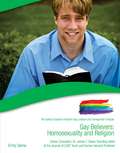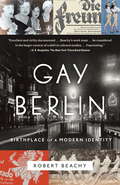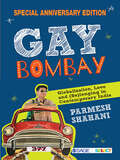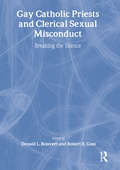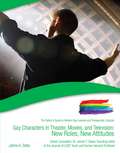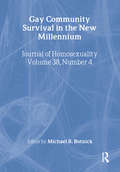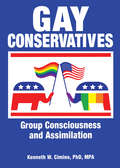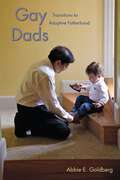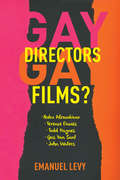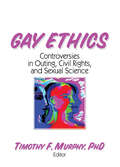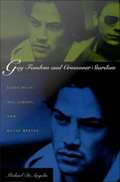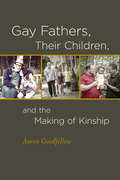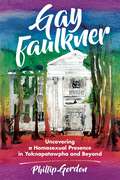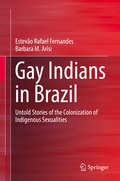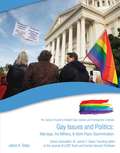- Table View
- List View
Gateway to U.S. History: The Bridge to Success on Florida's EOC Test
by Mark Jarrett Robert YahngBest preparation for Florida's End-of-Course Assessment in U.S. History
Gateways Of Asia
by BroezeFirst Published in 1997. Routledge is an imprint of Taylor & Francis, an informa company.
Gather at the Table: The Healing Journey of a Daughter of Slavery and a Son of the Slave Trade
by Thomas Norman Dewolf Sharon MorganTwo people--a black woman and a white man--confront the legacy of slavery and racism head-on Thomas DeWolf--a descendent of slaveholders--and Sharon Morgan--a descendent of slaves--come together to openly discuss how the legacy of slavery and racism has impacted their lives. Together, they disclose the various difficulties and rewards they experience as individuals striving to heal. Gather at the Table is a timely, candid, and deeply relevant book that offers an engaging model of restorative justice. "An extraordinary story of an honest, meaningful conversation across the racial divide. At times it hurts to read. And well it should. Centuries of injustice and trauma that face us every day in this country have no place for half-truths. Sharon and Tom took the harder road--searching for healing, they literally walked together into painful histories and found authentic friendship." --John Paul Lederach, coauthor of When Blood and Bones Cry Out: Journeys through the Soundscape of Healing and ReconciliationFrom the Hardcover edition.
Gathering Medicines: Nation and Knowledge in China’s Mountain South
by Judith Farquhar Lili LaiIn the early 2000s, the central government of China encouraged all of the nation’s registered minorities to “salvage, sort, synthesize, and elevate” folk medical knowledges in an effort to create local health care systems comparable to the nationally supported institutions of traditional Chinese medicine. Gathering Medicines bears witness to this remarkable moment of knowledge development while sympathetically introducing the myriad therapeutic traditions of southern China. Over a period of six years, Judith Farquhar and Lili Lai worked with seven minority nationality groups in China’s southern mountains, observing how medicines were gathered and local healing systems codified. Gathering Medicines shares their intimate view of how people understand ethnicity, locality, the body, and nature. This ethnography of knowledge diversities in multiethnic China is a testament to the rural wisdom of mountain healers, one that theorizes, from the ground up, the dynamic encounters between formal statist knowledge and the popular authority of the wild.
Gaviotas: A Village to Reinvent the World, 2nd Edition
by Alan WeismanLos Llanos—the rain-leached, eastern savannas of war-ravaged Colombia—are among the most brutal environments on Earth and an unlikely setting for one of the most hopeful environmental stories ever told.Here, in the late 1960s, a young Colombian development worker named Paolo Lugari wondered if the nearly uninhabited, infertile llanos could be made livable for his country&’s growing population. He had no idea that nearly four decades later, his experiment would be one of the world&’s most celebrated examples of sustainable living: a permanent village called Gaviotas.In the absence of infrastructure, the first Gaviotans invented wind turbines to convert mild breezes into energy, hand pumps capable of tapping deep sources of water, and solar collectors efficient enough to heat and even sterilize drinking water under perennially cloudy llano skies. Over time, the Gaviotans&’ experimentation has even restored an ecosystem: in the shelter of two million Caribbean pines planted as a source of renewable commercial resin, a primordial rain forest that once covered the llanos is unexpectedly reestablishing itself.Colombian author Gabriel García Márquez has called Paolo Lugari &“Inventor of the World.&” Lugari himself has said that Gaviotas is not a utopia: &“Utopia literally means &‘no place.&’ We call Gaviotas a topia, because it&’s real.&”Relive their story with this special 10th-anniversary edition of Gaviotas, complete with a new afterword by the author describing how Gaviotas has survived and progressed over the past decade.
Gay America: Struggle for Equality
by Linas AlsenasMilestones of gay and lesbian life in the United States are brought together in the first-ever nonfiction book published specifically for teens. Profusely illustrated with archival images, the groundbreaking Gay America reveals how gay men and women have lived, worked, and loved for the past 125 years. Gays and lesbians play a very prominent role in American life today, whether grabbing headlines over political gains, starring in and being the subject of movies and television shows, or filling the streets of nearly every major city each year to celebrate Gay Pride. However, this was not always the case, and this book charts their journey along with the history of the country. First touching on colonial times, the book moves on to the Victorian period and beyond, including such historical milestones as the Roaring '20s, the Kinsey study, the McCarthy witch hunts of the 1950s, the Beat generation, Stonewall, disco, AIDS, and present-day battles over gay marriage. Providing a sense of hope mixed with pride, author Linas Alsenas demonstrates how, within one century, gay women and men have gone from being socially invisible to becoming a political force to be reckoned with and proud members of the American public living openly and honestly. The book includes a bibliography and an index.
Gay American History: Lesbians and Gay Men in the U.S.A.
by Jonathan Ned KatzThis is the updated version of the most authoritative, scholarly and accurate history of gays and lesbians in the United States. The book includes original source documents, extensive footnotes and bibliographies. The book discusses the changing views of the scientific and religious communities. The book describes the impressions of early European explorers who encountered homosexuality among the Native American cultures. Other major subjects include women passing as men, a history of liberation and a history of love, and Walt Whitman's correspondence with John Addington Symonds.
Gay Artists in Modern American Culture
by Michael S. SherryToday it is widely recognized that gay men played a prominent role in defining the culture of mid-twentieth-century America, with such icons as Tennessee Williams, Edward Albee, Aaron Copland, Samuel Barber, Montgomery Clift, and Rock Hudson defining much of what seemed distinctly "American" on the stage and screen. Even though few gay artists were "out," their sexuality caused significant anxiety during a time of rampant antihomosexual attitudes. Michael Sherry offers a sophisticated analysis of the tension between the nation's simultaneous dependence on and fear of the cultural influence of gay artists.Sherry places conspiracy theories about the "homintern" (homosexual international) taking control and debasing American culture within the paranoia of the time that included anticommunism, anti-Semitism, and racism. Gay artists, he argues, helped shape a lyrical, often nationalist version of American modernism that served the nation's ambitions to create a cultural empire and win the Cold War. Their success made them valuable to the country's cultural empire but also exposed them to rising antigay sentiment voiced even at the highest levels of power (for example, by President Richard Nixon). Only late in the twentieth century, Sherry concludes, did suspicion slowly give way to an uneasy accommodation of gay artists' place in American life.
Gay Believers: Homosexuality and Religion
by Emily SannaFor centuries, organized religion has been one of the main forces of prejudice and rejection of gay, lesbian, bisexual, and transgender (LGBT) people. But the fact is, not all religious traditions are unfriendly to LGBT people, and some old ways of reading the Bible are being re-examined in new and welcoming ways. While many LGBT people struggle with the conflicts of being both religious and gay, many others are finding support and inclusion in religious communities that have entered the twenty-first century committed to the full inclusion of LGBT people. Learn about how the world's major religious traditions--Christianity, Judaism, Islam, Buddhism, and Hinduism--view homosexuality, and how faithful LGBT people within these traditions deal with the issues they face. Examine some of the reasons why some religious groups continue to condemn homosexuality and reject LGBT people. And discover that many religions have always had a place for gay and lesbian people in their communities, and how others are working hard to create that place.
Gay Berlin: Birthplace of a Modern Identity
by Robert BeachyAn unprecedented examination of the ways in which the uninhibited urban sexuality, sexual experimentation, and medical advances of pre-Weimar Berlin created and molded our modern understanding of sexual orientation and gay identity.<P> Known already in the 1850s for the friendly company of its "warm brothers" (German slang for men who love other men), Berlin, before the turn of the twentieth century, became a place where scholars, activists, and medical professionals could explore and begin to educate both themselves and Europe about new and emerging sexual identities. From Karl Heinrich Ulrichs, a German activist described by some as the first openly gay man, to the world of Berlin's vast homosexual subcultures, to a major sex scandal that enraptured the daily newspapers and shook the court of Emperor William II--and on through some of the very first sex reassignment surgeries--Robert Beachy uncovers the long-forgotten events and characters that continue to shape and influence the way we think of sexuality today. <P> Chapter by chapter Beachy's scholarship illuminates forgotten firsts, including the life and work of Dr. Magnus Hirschfeld, first to claim (in 1896) that same-sex desire is an immutable, biologically determined characteristic, and founder of the Institute for Sexual Science. Though raided and closed down by the Nazis in 1933, the institute served as, among other things, "a veritable incubator for the science of tran-sexuality," scene of one of the world's first sex reassignment surgeries. Fascinating, surprising, and informative--Gay Berlin is certain to be counted as a foundational cultural examination of human sexuality.
Gay Bombay: Globalization, Love and (Be)longing in Contemporary India
by Parmesh ShahaniThis was the first ethnography of gay life in contemporary India. It talked about the early age of the internet in the country and the creation of online-offline gay communities from the mid-1990s to the mid 2000s. The anniversary edition has chapters from leading global scholars about the continuing importance of the book, as well as an updated preface from the author. It has an interview as an afterword that talks about the path ahead for queer rights in India, in the context of the recent Supreme Court judgement decriminalizing homosexuality.
Gay Catholic Priests and Clerical Sexual Misconduct: Breaking the Silence
by Robert Goss Donald Boisvert“Why did it take 30 years for American bishops to listen to the victims of Catholic clerical abuse?” Gay Catholic Priests and Clerical Sexual Misconduct: Breaking the Silence is a compelling indictment of Roman Catholic teachings on homosexuality and sexuality. Inspired by The Silence of Sodom: Homosexuality in Modern Catholicism, Mark Jordan’s controversial examination of homoeroticism in American Catholic culture, this groundbreaking book examines how the current crisis of clerical abuse affects and stigmatizes gay priests living in a climate of hysteria and condemnation. The book’s contributors, an eclectic mix of scholars and clerics, question whether the church can survive centuries of secrets and scandals. In the wake of very real concerns about a possible inquisition launched by the Catholic Church against its gay members, Gay Catholic Priests and Clerical Sexual Misconduct continues the efforts of the Gay Men’s Issues in Religion Group of the American Academy of Religion to honor the work of Mark Jordan, who contributes his thoughts on the issues raised by the book. A panel of former Jesuits, a former seminarian with the Congregation of the Blessed Sacrament, a Dominican, a Franciscan, and several feminist authors present different perspectives on gay priests, clerical/ecclesial misogyny, games of power and abuse, and religious scapegoating, writing with eloquence and pain, a great deal of pride, and a touch of justifiable divine righteousness. Gay Catholic Priests and Clerical Sexual Misconduct includes:“Celibate Men, Ambivalent Saints, and Games of Desire”, “A Call to Liberation of Gay Catholic Clergy”, “Speaking Loud or Shutting Up: The Homosexual-type Problem”, “Those Troubling Gay Priests”, “Catholicism and a Crisis of Intimate Relations” and much more! Gay Catholic Priests and Clerical Sexual Misconduct: Breaking the Silence is an invaluable resource for academics, members of the clergy, seminarians, chaplains and counselors, and anyone interested in homosexuality and religion.
Gay Characters in Theater, Movies, and Television: New Roles, New Attitudes
by Jaime A. SebaFrom tiny stages in art house theaters to Oscar-winning big-screen performances, more and more people are tuning in to see gay characters represented in new diverse and intriguing ways. And as lesbian, gay, bisexual, and transgender (LGBT) characters become more common in mainstream entertainment, people develop new attitudes about the gay and lesbian people they know in real life. Explore how theater productions, films, and television shows have changed through time to become more inclusive of LGBT character and issues. From AIDS-themed stage shows such as Angels in America and Rent to critically-acclaimed films like Brokeback Mountain and small screen hits like Glee and Will & Grace, consider how these representations of gay people affect people's perception of the LGBT community.
Gay Community Survival in the New Millennium
by Michael R BotnickUnderstand the international challenges facing gay male societies! This eye-opening account examines the idealistic, structural, and emotional meanings of community within the gay population. Gay Community Survival in the New Millennium explores the concept of “gay community” as well as the problems and progress that these communities are facing in the United States, Canada, and Israel. As a community leader, gay rights advocate, or policymaker, you will gain insight into issues that must be addressed now in order to strengthen your own community. Gay Community Survival in the New Millennium explores many of the fractures in gay society that must be addressed to ensure progress in the gay liberation movements, including: racial and ethnic divisions in the gay community, especially based on HIV-positive and HIV-negative status, and programs that work to bridge this gap the rift between HIV-positive and HIV-negative gay men based on the allocation of money for social programs meant to support entire gay communities AIDSphobia, the irrational fear of contracting the virus and how it has affected gay communities the Israeli gay rights movement, which is visibly pursuing full and equal citizenship in Israel, including acceptance into the Israeli military projections for gay rights movements in the future if homophobia continues to exist the enormous power that would be created if all gay and AIDS social organizations in a given geographic region banded together to influence change in social policies and eliminate stereotypesGay Community Survival in the New Millennium explores what it means to be a gay man in today's communities, from the fear of AIDS and the need for financing of gay men's social programs to forming a collective organization that will work for the gay men's liberation movements. This essential guide will provide you with suggestions to help you shape and successfully change your gay community.
Gay Conservatives: Group Consciousness and Assimilation
by Kenneth Cimino WDiscover why LGBT voters support conservative political platforms that don&’t benefit the LGBT communityRecent studies show that the vast majority of the LGBT community considers itself politically liberally. Yet nearly 25% of all LGBT voters helped re-elect George W. Bush in 2004-who are these people and why did they make that choice? Gay Conservatives examines why conservative LGBTs join political groups and support political candidates that not only don&’t favor policies that benefit the LGBT community, but in some cases, advocate prejudicial policies. This thought-provoking book looks at the impact of "group consciousness" on conservative LGBTs and how it affects political power and social construction. Gay Conservatives uses both quantitative and qualitative studies that center on conservative LGBTs within in the LGBT community, while using data collected on liberal LGBTs for comparison purposes. Log Cabin Republicans and StoneWall Democrats in several cities were interviewed and an online survey of more than 1,000 LGBTs was conducted by the Gill Foundation in an effort to understand the political identity of conservative LGBTs and how it fits into the bigger picture in the LGBT community. The book examines how-and why-conservative LGBT activity conflicts with the general interests of the community, including the "constitutional" rights of LGBT individuals to marry, whether LGBTs should be allowed to serve openly in the United States military, and whether state and local governments should play a more significant role in dealing with hate crimes directed at the LGBT community.Topics discussed in Gay Conservatives include: group consciousness and minority identity pluralism David Truman the homosexual identity stages the history of the gay liberation movement creating a group identity the Mattachine Society Stonewall the impact of AIDS the rise of "Queer Nation" the difficulties of "coming out" and much moreGay Conservatives is an enlightening and educational read for anyone interested in politics and the political behavior of voters in the United States.
Gay Cuban Nation
by Emilio BejelWith Gay Cuban Nation, Emilio Bejel looks at Cuba's markedly homoerotic culture through writings about homosexuality, placing them in the social and political contexts that led up to the Cuban Revolution. By reading against the grain of a wide variety of novels, short stories, autobiographies, newspaper articles, and films, Bejel maps out a fascinating argument about the way in which different attitudes toward power and nationalism struggle for an authoritative stance on homosexual issues. Through close readings of writers such as José Martí, Alfonso Hernández-Catá, Carlos Montenegro, José Lezama Lima, Leonardo Padura Fuentes, and Reinaldo Arenas, whose heartbreaking autobiography, Before Night Falls, has enjoyed renewed popularity, Gay Cuban Nation shows that the category of homosexuality is always lurking, ghostlike, in the shadows of nationalist discourse. The book stakes out Cuba's sexual battlefield, and will challenge the homophobia of both Castro's revolutionaries and Cuban exiles in the States.
Gay Dads: Transitions to Adoptive Fatherhood (Qualitative Studies in Psychology #6)
by Abbie E. GoldbergWhen gay couples become parents, they face a host of questions and issues that their straight counterparts may never have to consider. How important is it for each partner to have a biological tie to their child? How will they become parents: will they pursue surrogacy, or will they adopt? Will both partners legally be able to adopt their child? Will they have to hide their relationship to speed up the adoption process? Will one partner be the primary breadwinner? And how will their lives change, now that the presence of a child has made their relationship visible to the rest of the world? In Gay Dads: Transitions to Adoptive Fatherhood, Abbie E. Goldberg examines the ways in which gay fathers approach and negotiate parenthood when they adopt. Drawing on empirical data from her in-depth interviews with 70 gay men, Goldberg analyzes how gay dads interact with competing ideals of fatherhood and masculinity, alternately pioneering and accommodating heteronormative “parenthood culture.” The first study of gay men's transitions to fatherhood, this work will appeal to a wide range of readers, from those in the social sciences to social work to legal studies, as well as to gay-adoptive parent families themselves.
Gay Directors, Gay Films?: Pedro Almodóvar, Terence Davies, Todd Haynes, Gus Van Sant, John Waters
by Emanuel LevyThrough intimate encounters with the life and work of five contemporary gay male directors, this book develops a framework for interpreting what it means to make a gay film or adopt a gay point of view. For most of the twentieth century, gay characters and gay themes were both underrepresented and misrepresented in mainstream cinema. Since the 1970s, however, a new generation of openly gay directors has turned the closet inside out, bringing a new and poignant immediacy to modern cinema and popular culture.Combining his experienced critique with in-depth interviews conducted with each director, Emanuel Levy draws a clear timeline of gay filmmaking over the past four decades and its particular influences and innovations. While recognizing the "queering" of American culture that resulted from these films, Levy also takes stock of the ensuing conservative backlash and its impact on cinematic art, a trend that continues alongside the growing acceptance of homosexuality. He compares the similarities and differences between the "North American" attitudes of Todd Haynes, Gus Van Sant, and John Waters and the "European" perspectives of Pedro Almodóvar and Terence Davies, developing a truly comprehensive, up-to-date approach to gay filmmaking in particular and auteur cinema in general.
Gay Directors, Gay Films?: Pedro Almodóvar, Terence Davies, Todd Haynes, Gus Van Sant, John Waters
by Emanuel LevyThrough intimate encounters with the life and work of five contemporary gay male directors, this book develops a framework for interpreting what it means to make a gay film or adopt a gay point of view. For most of the twentieth century, gay characters and gay themes were both underrepresented and misrepresented in mainstream cinema. Since the 1970s, however, a new generation of openly gay directors has turned the closet inside out, bringing a poignant immediacy to modern cinema and popular culture.Combining his experienced critique with in-depth interviews, Emanuel Levy draws a clear timeline of gay filmmaking over the past four decades and its particular influences and innovations. While recognizing the "queering" of American culture that resulted from these films, Levy also takes stock of the ensuing conservative backlash and its impact on cinematic art, a trend that continues alongside a growing acceptance of homosexuality. He compares the similarities and differences between the "North American" attitudes of Todd Haynes, Gus Van Sant, and John Waters and the "European" perspectives of Pedro Almodóvar and Terence Davies, developing a truly expansive approach to gay filmmaking and auteur cinema.
Gay Ethics: Controversies in Outing, Civil Rights, and Sexual Science
by Timothy F MurphyGay Ethics is an anthology that addresses ethical questions involving key moral issues of today--sexual morality, outing, gay and lesbian marriages, military service, anti-discrimination laws, affirmative action policies, the moral significance of sexual orientation research, and the legacy of homophobia in health care. It focuses on these issues within the social context of the lives of gay men and lesbians and makes evident the ways in which ethics can and should be reclaimed to pursue the moral good for gay men and lesbians.Gay Ethics is a timely book that illustrates the inadequacies of various moral arguments used in regard to homosexuality. This book reaches a new awareness for the standing and treatment of gay men and lesbians in society by moving beyond conventional philosophical analyses that focus exclusively on the morality of specific kinds of sexual acts, the nature of perversion, or the cogency of scientific accounts of the origins of homoeroticism. It raises pertinent questions about the meaning of sexuality for private and public life, civics, and science. Some of the issues covered: Sexual Morality Outing Same-Sex Marriage Military Service Anti-Discrimination Laws Affirmative Action Policy The Scientific Study of Sexual Orientation Bias in Psychoanalysis Homophobia in Health CareGay Ethics presents a wide range of perspectives but remains united in the common purpose of illuminating moral arguments and social policies as they involve homosexuality. The chapters challenge social oppression in the military, civil rights, and the social conventions observed among gay men and lesbians themselves. This book is applicable to a broad range of academics working in gay and lesbian studies and because of its current content, is of interest to an educated lay public. It will be a standard reference point for future discussion of the matters it addresses.
Gay Fandom and Crossover Stardom: James Dean, Mel Gibson, and Keanu Reeves
by Michael DeangelisWhy and how does the appeal of certain male Hollywood stars cross over from straight to gay audiences? Do stars lose their cachet with straight audiences when they cross over? In Gay Fandom and Crossover Stardom Michael DeAngelis responds to these questions with a provocative analysis of three famous actors--James Dean, Mel Gibson, and Keanu Reeves. In the process, he traces a fifty-year history of audience reception that moves gay male fandom far beyond the realm of "camp" to places where culturally unauthorized fantasies are nurtured, developed, and shared. DeAngelis examines a variety of cultural documents, including studio publicity and promotional campaigns, star biographies, scandal magazines, and film reviews, as well as gay political and fan literature that ranges from the closeted pages of One and Mattachine Review in the 1950s to the very "out" dish columns, listserv postings, and on-line star fantasy narratives of the past decade. At the heart of this close historical study are treatments of particular film narratives, including East of Eden, Rebel Without a Cause, The Road Warrior, Lethal Weapon, My Own Private Idaho, and Speed. Using theories of fantasy and melodrama, Gay Fandom and Crossover Stardom demonstrates how studios, agents, and even stars themselves often actively facilitate an audience's strategic blurring of the already tenuous distinction between the heterosexual mainstream and the gay margins of American popular culture. In addition to fans of James Dean, Mel Gibson, and Keanu Reeves, those interested in film history, cultural studies, popular culture, queer theory, gender studies, sociology, psychoanalytic theory, melodrama, fantasy, and fandom will enjoy this book.
Gay Fathers, Their Children, and the Making of Kinship
by Aaron GoodfellowWhile the topic of gay marriage and families continues to be popular in the media, few scholarly works focus on gay men with children. Based on ten years of fieldwork among gay families living in the rural, suburban, and urban area of the eastern United States, Gay Fathers, Their Children, and the Making of Kinship presents a beautifully written and meticulously argued ethnography of gay men and the families they have formed.In a culture that places a premium on biology as the founding event of paternity, Aaron Goodfellow poses the question: Can the signing of legal contracts and the public performances of care replace biological birth as the singular event marking the creation of fathers? Beginning with a comprehensive review of the relevant literature in this field, four chapters—each presenting a particular picture of paternity—explore a range of issues, such as interracial adoption, surrogacy, the importance of physical resemblance in familial relationships, single parenthood, delinquency, and the ways in which the state may come to define the norms of health. The author deftly illustrates how fatherhood for gay men draws on established biological, theological, and legal images of the family often thought oppressive to the emergence of queer forms of social life.Chosen with care and described with great sensitivity, each carefully researched case examines gay fatherhood through life narratives. Painstakingly theorized, Gay Fathers, Their Children, and the Making of Kinship contends that gay families are one of the most important areas to which social scientists might turn in order to understand how law, popular culture, and biology are simultaneously made manifest and interrogated in everyday life. By focusing specifically on gay fathers, Goodfellow produces an anthropological account of how paternity, sexuality, and masculinity are leveraged in relations of care between gay fathers and their children.
Gay Faulkner: Uncovering a Homosexual Presence in Yoknapatawpha and Beyond
by Phillip GordonThe life and works of William Faulkner have generated numerous biographical studies exploring how Faulkner understood southern history, race, his relationship to art, and his place in the canons of American and world literature. However, some details on Faulkner’s life collected by his early biographers never made it into published form or, when they did, appeared in marginalized stories and cryptic references. The biographical record of William Faulkner’s life has yet to come to terms with the life-long friendships he maintained with gay men, the extent to which he immersed himself into gay communities in Greenwich Village and New Orleans, and how profoundly this part of his life influenced his “apocryphal” creation of Yoknapatawpha County. Gay Faulkner: Uncovering a Homosexual Presence in Yoknapatawpha and Beyond explores the intimate friendships Faulkner maintained with gay men, among them Ben Wasson, William Spratling, and Hubert Creekmore, and places his fiction into established canons of LGBTQ literature, including World War I literature and representations of homosexuality from the Cold War. The book offers a full consideration of his relationship to gay history and identity in the twentieth century, giving rise to a new understanding of this most important of American authors.
Gay Indians in Brazil
by Estevão Rafael Fernandes Barbara M. ArisiThis book unveils an ignored aspect of the Brazilian history: how the colonization of the country shaped the sexuality of its indigenous population. Based on textual research, the authors show how the government and religious institutions gradually imposed the family model considered as "normal" to Brazilian indigenous gays through forced labor, punishment, marriages with non-indigenous and other methods. However, such disciplinary practices didn't prevent the resistance of the natives whose sexuality operates out of the hegemonic model, and the book also analyzes the impact of these forms of dissent on the development of indigenous movements, interethnic relations and indigenous policies in Brazil. Building upon Post-Colonial and Queer theories, the authors present a historical overview of the ideas and practices employed by the religious and governmental authorities to repress homosexuality among indigenous peoples since the beginning of the colonization process, on the 16th century. They also show how this process of colonization of indigenous sexualities goes beyond the formal colonization period, which ended with the Brazilian Independence in 1822, and is part of a wider process of compulsory heterosexualization and heteronormativity of native peoples, based on scientific, theological, social and cultural assumptions that inspired religious, civilizing, academic and political practices throughout Brazilian history.
Gay Issues and Politics: Marriage, the Military, & Work Place Discrimination
by Jaime A. SebaNews media, television, music and entertainment are filled with images of gay and lesbian people today. But how did it all begin? Explore the history of the lesbian, gay, bisexual and transgender (LGBT) community in the United States, from the horrifying medical treatments of the early twentieth century to the 1969 Stonewall riots that sparked an international movement for equality. Then take a closer look at three of the most relevant issues facing LGBT people today. Learn what the "Don't Ask, Don't Tell" policy of the American military looks like to soldiers in the armed forces. Share the personal experiences of couples affected by laws banning gay marriage and people who have been victims of workplace discrimination.

